ABC Company: Mastering the Crisis Management Function - A Report
VerifiedAdded on 2023/04/21
|5
|1632
|207
Report
AI Summary
This report investigates the importance of crisis management for managers, particularly focusing on why and how they should master this function. It defines crisis, outlines its characteristics, and provides an example of a past crisis (the 2007 recession) to illustrate key lessons. The report emphasizes the need for organizations to prepare for crises by forming dedicated teams and developing contingency plans. Effective communication during a crisis, utilizing technology to disseminate information and manage stakeholder expectations, is also highlighted. The conclusion underscores that mastering crisis management is essential for organizations to navigate external pressures and maintain stability in a dynamic business environment. Desklib offers a wealth of similar resources, including past papers and solved assignments, to aid students in their studies.
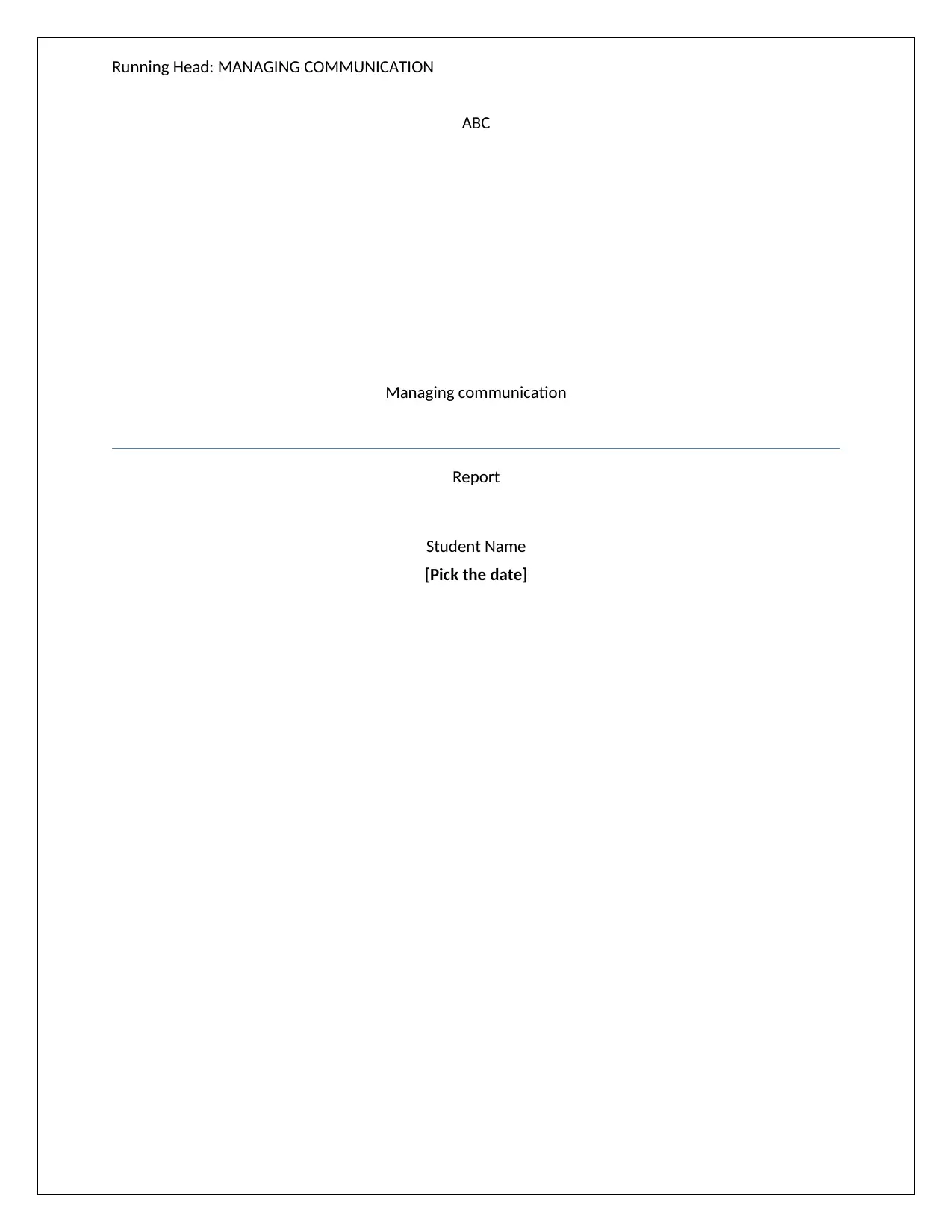
Running Head: MANAGING COMMUNICATION
ABC
Managing communication
Report
Student Name
[Pick the date]
ABC
Managing communication
Report
Student Name
[Pick the date]
Paraphrase This Document
Need a fresh take? Get an instant paraphrase of this document with our AI Paraphraser
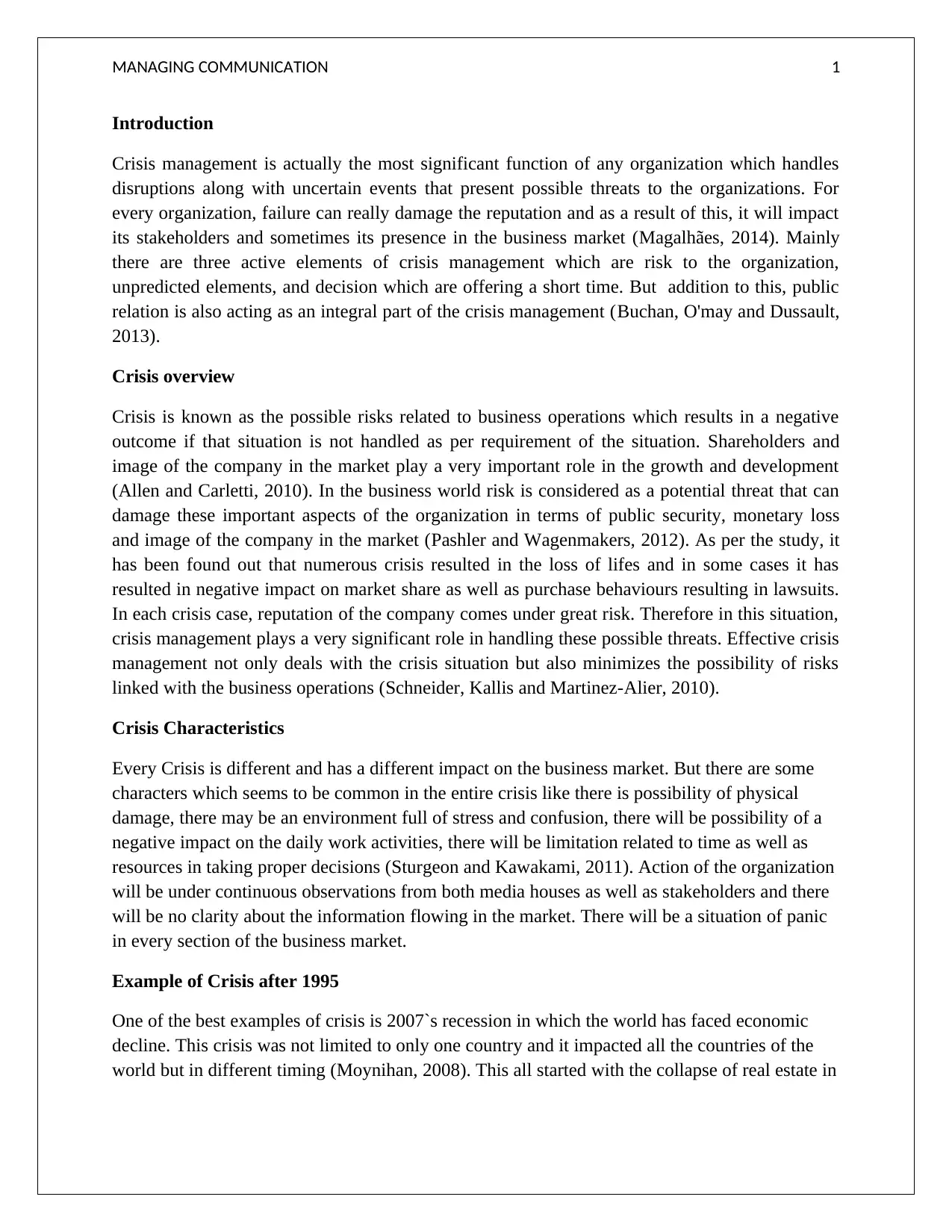
MANAGING COMMUNICATION 1
Introduction
Crisis management is actually the most significant function of any organization which handles
disruptions along with uncertain events that present possible threats to the organizations. For
every organization, failure can really damage the reputation and as a result of this, it will impact
its stakeholders and sometimes its presence in the business market (Magalhães, 2014). Mainly
there are three active elements of crisis management which are risk to the organization,
unpredicted elements, and decision which are offering a short time. But addition to this, public
relation is also acting as an integral part of the crisis management (Buchan, O'may and Dussault,
2013).
Crisis overview
Crisis is known as the possible risks related to business operations which results in a negative
outcome if that situation is not handled as per requirement of the situation. Shareholders and
image of the company in the market play a very important role in the growth and development
(Allen and Carletti, 2010). In the business world risk is considered as a potential threat that can
damage these important aspects of the organization in terms of public security, monetary loss
and image of the company in the market (Pashler and Wagenmakers, 2012). As per the study, it
has been found out that numerous crisis resulted in the loss of lifes and in some cases it has
resulted in negative impact on market share as well as purchase behaviours resulting in lawsuits.
In each crisis case, reputation of the company comes under great risk. Therefore in this situation,
crisis management plays a very significant role in handling these possible threats. Effective crisis
management not only deals with the crisis situation but also minimizes the possibility of risks
linked with the business operations (Schneider, Kallis and Martinez-Alier, 2010).
Crisis Characteristics
Every Crisis is different and has a different impact on the business market. But there are some
characters which seems to be common in the entire crisis like there is possibility of physical
damage, there may be an environment full of stress and confusion, there will be possibility of a
negative impact on the daily work activities, there will be limitation related to time as well as
resources in taking proper decisions (Sturgeon and Kawakami, 2011). Action of the organization
will be under continuous observations from both media houses as well as stakeholders and there
will be no clarity about the information flowing in the market. There will be a situation of panic
in every section of the business market.
Example of Crisis after 1995
One of the best examples of crisis is 2007`s recession in which the world has faced economic
decline. This crisis was not limited to only one country and it impacted all the countries of the
world but in different timing (Moynihan, 2008). This all started with the collapse of real estate in
Introduction
Crisis management is actually the most significant function of any organization which handles
disruptions along with uncertain events that present possible threats to the organizations. For
every organization, failure can really damage the reputation and as a result of this, it will impact
its stakeholders and sometimes its presence in the business market (Magalhães, 2014). Mainly
there are three active elements of crisis management which are risk to the organization,
unpredicted elements, and decision which are offering a short time. But addition to this, public
relation is also acting as an integral part of the crisis management (Buchan, O'may and Dussault,
2013).
Crisis overview
Crisis is known as the possible risks related to business operations which results in a negative
outcome if that situation is not handled as per requirement of the situation. Shareholders and
image of the company in the market play a very important role in the growth and development
(Allen and Carletti, 2010). In the business world risk is considered as a potential threat that can
damage these important aspects of the organization in terms of public security, monetary loss
and image of the company in the market (Pashler and Wagenmakers, 2012). As per the study, it
has been found out that numerous crisis resulted in the loss of lifes and in some cases it has
resulted in negative impact on market share as well as purchase behaviours resulting in lawsuits.
In each crisis case, reputation of the company comes under great risk. Therefore in this situation,
crisis management plays a very significant role in handling these possible threats. Effective crisis
management not only deals with the crisis situation but also minimizes the possibility of risks
linked with the business operations (Schneider, Kallis and Martinez-Alier, 2010).
Crisis Characteristics
Every Crisis is different and has a different impact on the business market. But there are some
characters which seems to be common in the entire crisis like there is possibility of physical
damage, there may be an environment full of stress and confusion, there will be possibility of a
negative impact on the daily work activities, there will be limitation related to time as well as
resources in taking proper decisions (Sturgeon and Kawakami, 2011). Action of the organization
will be under continuous observations from both media houses as well as stakeholders and there
will be no clarity about the information flowing in the market. There will be a situation of panic
in every section of the business market.
Example of Crisis after 1995
One of the best examples of crisis is 2007`s recession in which the world has faced economic
decline. This crisis was not limited to only one country and it impacted all the countries of the
world but in different timing (Moynihan, 2008). This all started with the collapse of real estate in
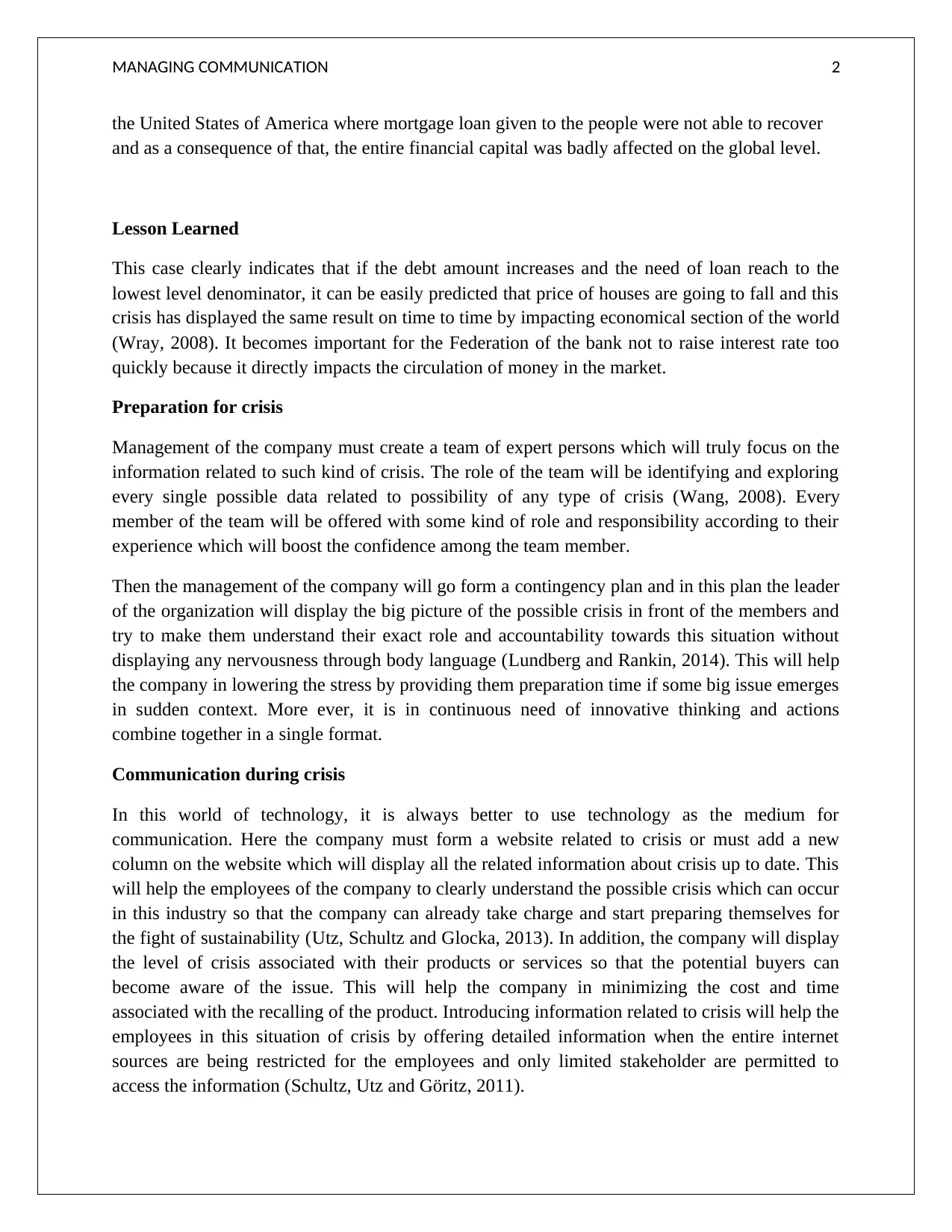
MANAGING COMMUNICATION 2
the United States of America where mortgage loan given to the people were not able to recover
and as a consequence of that, the entire financial capital was badly affected on the global level.
Lesson Learned
This case clearly indicates that if the debt amount increases and the need of loan reach to the
lowest level denominator, it can be easily predicted that price of houses are going to fall and this
crisis has displayed the same result on time to time by impacting economical section of the world
(Wray, 2008). It becomes important for the Federation of the bank not to raise interest rate too
quickly because it directly impacts the circulation of money in the market.
Preparation for crisis
Management of the company must create a team of expert persons which will truly focus on the
information related to such kind of crisis. The role of the team will be identifying and exploring
every single possible data related to possibility of any type of crisis (Wang, 2008). Every
member of the team will be offered with some kind of role and responsibility according to their
experience which will boost the confidence among the team member.
Then the management of the company will go form a contingency plan and in this plan the leader
of the organization will display the big picture of the possible crisis in front of the members and
try to make them understand their exact role and accountability towards this situation without
displaying any nervousness through body language (Lundberg and Rankin, 2014). This will help
the company in lowering the stress by providing them preparation time if some big issue emerges
in sudden context. More ever, it is in continuous need of innovative thinking and actions
combine together in a single format.
Communication during crisis
In this world of technology, it is always better to use technology as the medium for
communication. Here the company must form a website related to crisis or must add a new
column on the website which will display all the related information about crisis up to date. This
will help the employees of the company to clearly understand the possible crisis which can occur
in this industry so that the company can already take charge and start preparing themselves for
the fight of sustainability (Utz, Schultz and Glocka, 2013). In addition, the company will display
the level of crisis associated with their products or services so that the potential buyers can
become aware of the issue. This will help the company in minimizing the cost and time
associated with the recalling of the product. Introducing information related to crisis will help the
employees in this situation of crisis by offering detailed information when the entire internet
sources are being restricted for the employees and only limited stakeholder are permitted to
access the information (Schultz, Utz and Göritz, 2011).
the United States of America where mortgage loan given to the people were not able to recover
and as a consequence of that, the entire financial capital was badly affected on the global level.
Lesson Learned
This case clearly indicates that if the debt amount increases and the need of loan reach to the
lowest level denominator, it can be easily predicted that price of houses are going to fall and this
crisis has displayed the same result on time to time by impacting economical section of the world
(Wray, 2008). It becomes important for the Federation of the bank not to raise interest rate too
quickly because it directly impacts the circulation of money in the market.
Preparation for crisis
Management of the company must create a team of expert persons which will truly focus on the
information related to such kind of crisis. The role of the team will be identifying and exploring
every single possible data related to possibility of any type of crisis (Wang, 2008). Every
member of the team will be offered with some kind of role and responsibility according to their
experience which will boost the confidence among the team member.
Then the management of the company will go form a contingency plan and in this plan the leader
of the organization will display the big picture of the possible crisis in front of the members and
try to make them understand their exact role and accountability towards this situation without
displaying any nervousness through body language (Lundberg and Rankin, 2014). This will help
the company in lowering the stress by providing them preparation time if some big issue emerges
in sudden context. More ever, it is in continuous need of innovative thinking and actions
combine together in a single format.
Communication during crisis
In this world of technology, it is always better to use technology as the medium for
communication. Here the company must form a website related to crisis or must add a new
column on the website which will display all the related information about crisis up to date. This
will help the employees of the company to clearly understand the possible crisis which can occur
in this industry so that the company can already take charge and start preparing themselves for
the fight of sustainability (Utz, Schultz and Glocka, 2013). In addition, the company will display
the level of crisis associated with their products or services so that the potential buyers can
become aware of the issue. This will help the company in minimizing the cost and time
associated with the recalling of the product. Introducing information related to crisis will help the
employees in this situation of crisis by offering detailed information when the entire internet
sources are being restricted for the employees and only limited stakeholder are permitted to
access the information (Schultz, Utz and Göritz, 2011).
⊘ This is a preview!⊘
Do you want full access?
Subscribe today to unlock all pages.

Trusted by 1+ million students worldwide
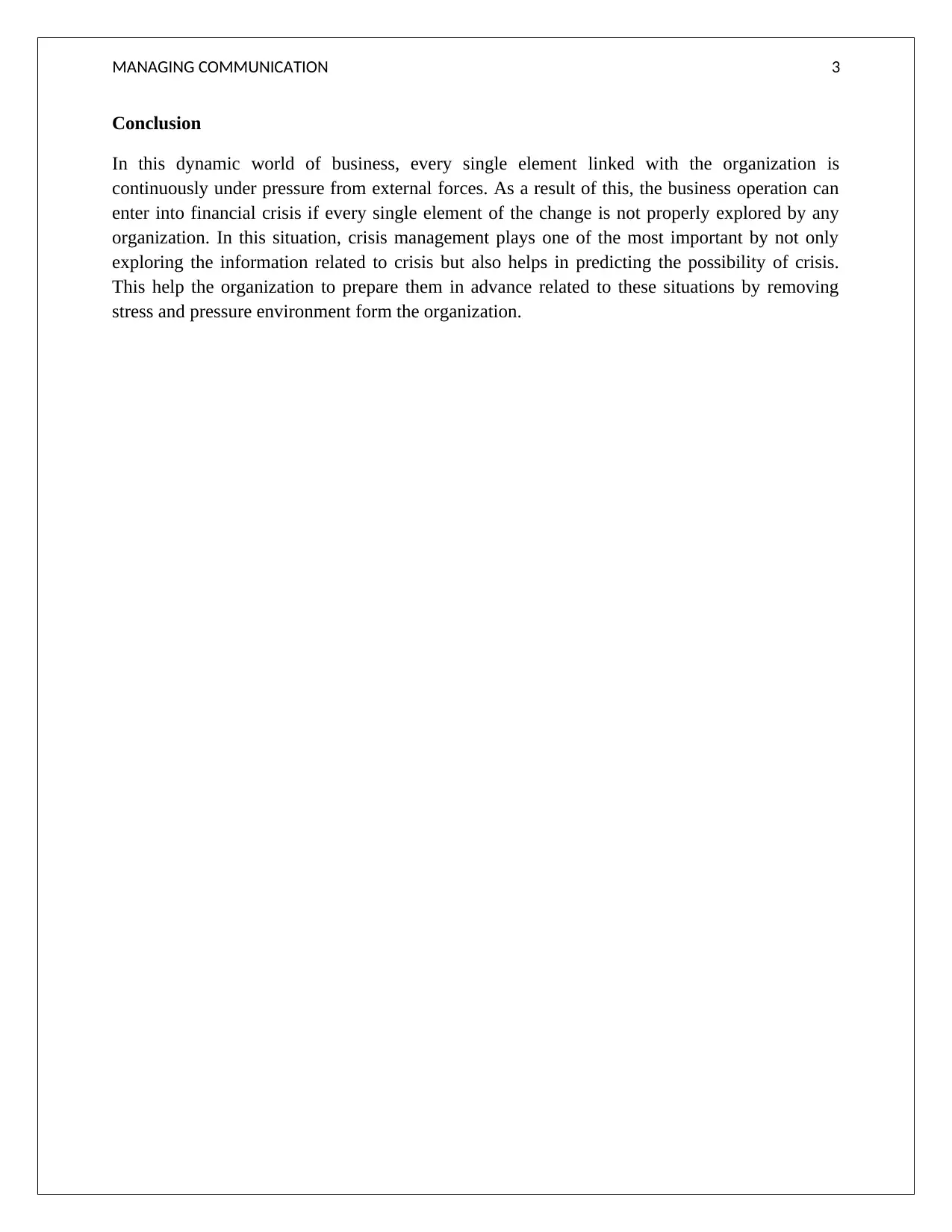
MANAGING COMMUNICATION 3
Conclusion
In this dynamic world of business, every single element linked with the organization is
continuously under pressure from external forces. As a result of this, the business operation can
enter into financial crisis if every single element of the change is not properly explored by any
organization. In this situation, crisis management plays one of the most important by not only
exploring the information related to crisis but also helps in predicting the possibility of crisis.
This help the organization to prepare them in advance related to these situations by removing
stress and pressure environment form the organization.
Conclusion
In this dynamic world of business, every single element linked with the organization is
continuously under pressure from external forces. As a result of this, the business operation can
enter into financial crisis if every single element of the change is not properly explored by any
organization. In this situation, crisis management plays one of the most important by not only
exploring the information related to crisis but also helps in predicting the possibility of crisis.
This help the organization to prepare them in advance related to these situations by removing
stress and pressure environment form the organization.
Paraphrase This Document
Need a fresh take? Get an instant paraphrase of this document with our AI Paraphraser
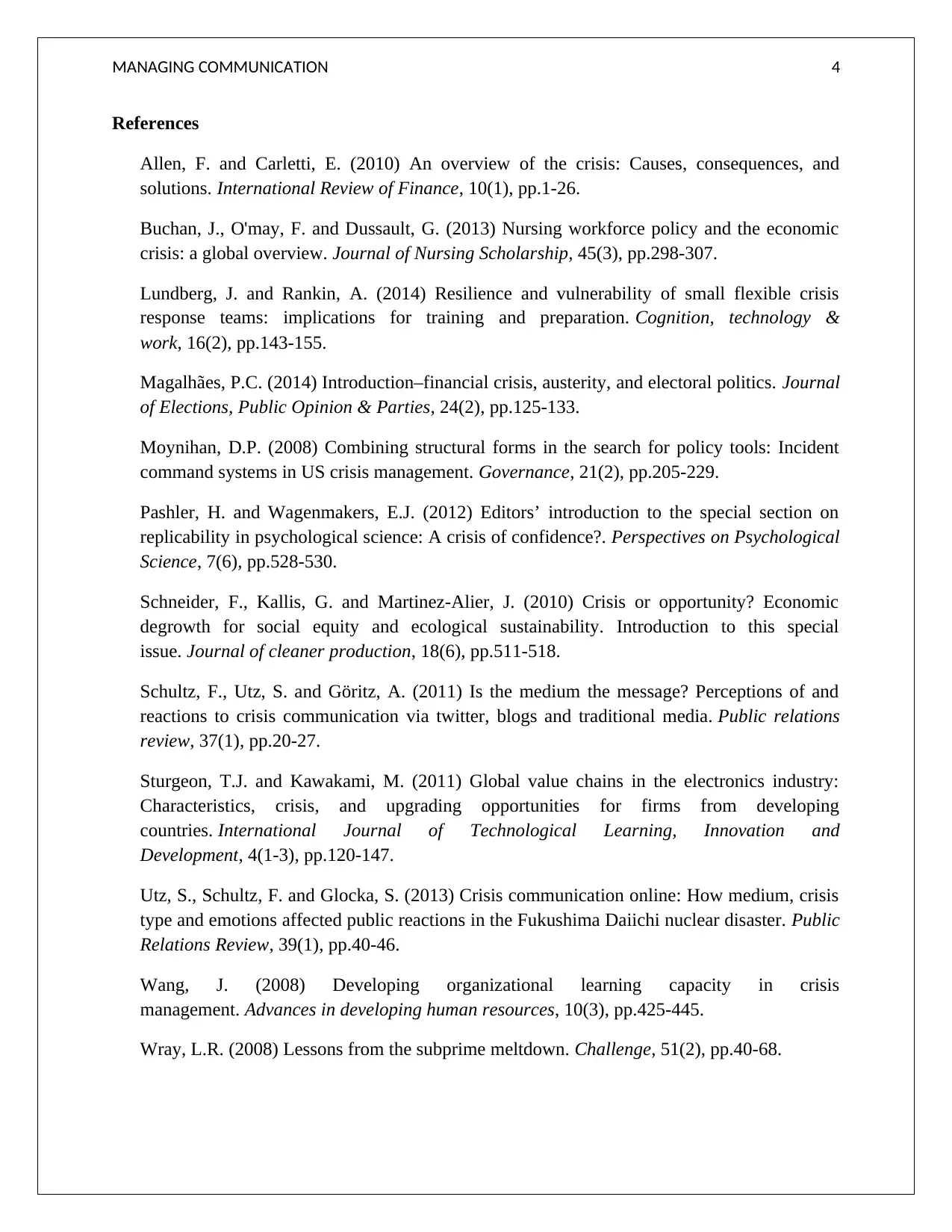
MANAGING COMMUNICATION 4
References
Allen, F. and Carletti, E. (2010) An overview of the crisis: Causes, consequences, and
solutions. International Review of Finance, 10(1), pp.1-26.
Buchan, J., O'may, F. and Dussault, G. (2013) Nursing workforce policy and the economic
crisis: a global overview. Journal of Nursing Scholarship, 45(3), pp.298-307.
Lundberg, J. and Rankin, A. (2014) Resilience and vulnerability of small flexible crisis
response teams: implications for training and preparation. Cognition, technology &
work, 16(2), pp.143-155.
Magalhães, P.C. (2014) Introduction–financial crisis, austerity, and electoral politics. Journal
of Elections, Public Opinion & Parties, 24(2), pp.125-133.
Moynihan, D.P. (2008) Combining structural forms in the search for policy tools: Incident
command systems in US crisis management. Governance, 21(2), pp.205-229.
Pashler, H. and Wagenmakers, E.J. (2012) Editors’ introduction to the special section on
replicability in psychological science: A crisis of confidence?. Perspectives on Psychological
Science, 7(6), pp.528-530.
Schneider, F., Kallis, G. and Martinez-Alier, J. (2010) Crisis or opportunity? Economic
degrowth for social equity and ecological sustainability. Introduction to this special
issue. Journal of cleaner production, 18(6), pp.511-518.
Schultz, F., Utz, S. and Göritz, A. (2011) Is the medium the message? Perceptions of and
reactions to crisis communication via twitter, blogs and traditional media. Public relations
review, 37(1), pp.20-27.
Sturgeon, T.J. and Kawakami, M. (2011) Global value chains in the electronics industry:
Characteristics, crisis, and upgrading opportunities for firms from developing
countries. International Journal of Technological Learning, Innovation and
Development, 4(1-3), pp.120-147.
Utz, S., Schultz, F. and Glocka, S. (2013) Crisis communication online: How medium, crisis
type and emotions affected public reactions in the Fukushima Daiichi nuclear disaster. Public
Relations Review, 39(1), pp.40-46.
Wang, J. (2008) Developing organizational learning capacity in crisis
management. Advances in developing human resources, 10(3), pp.425-445.
Wray, L.R. (2008) Lessons from the subprime meltdown. Challenge, 51(2), pp.40-68.
References
Allen, F. and Carletti, E. (2010) An overview of the crisis: Causes, consequences, and
solutions. International Review of Finance, 10(1), pp.1-26.
Buchan, J., O'may, F. and Dussault, G. (2013) Nursing workforce policy and the economic
crisis: a global overview. Journal of Nursing Scholarship, 45(3), pp.298-307.
Lundberg, J. and Rankin, A. (2014) Resilience and vulnerability of small flexible crisis
response teams: implications for training and preparation. Cognition, technology &
work, 16(2), pp.143-155.
Magalhães, P.C. (2014) Introduction–financial crisis, austerity, and electoral politics. Journal
of Elections, Public Opinion & Parties, 24(2), pp.125-133.
Moynihan, D.P. (2008) Combining structural forms in the search for policy tools: Incident
command systems in US crisis management. Governance, 21(2), pp.205-229.
Pashler, H. and Wagenmakers, E.J. (2012) Editors’ introduction to the special section on
replicability in psychological science: A crisis of confidence?. Perspectives on Psychological
Science, 7(6), pp.528-530.
Schneider, F., Kallis, G. and Martinez-Alier, J. (2010) Crisis or opportunity? Economic
degrowth for social equity and ecological sustainability. Introduction to this special
issue. Journal of cleaner production, 18(6), pp.511-518.
Schultz, F., Utz, S. and Göritz, A. (2011) Is the medium the message? Perceptions of and
reactions to crisis communication via twitter, blogs and traditional media. Public relations
review, 37(1), pp.20-27.
Sturgeon, T.J. and Kawakami, M. (2011) Global value chains in the electronics industry:
Characteristics, crisis, and upgrading opportunities for firms from developing
countries. International Journal of Technological Learning, Innovation and
Development, 4(1-3), pp.120-147.
Utz, S., Schultz, F. and Glocka, S. (2013) Crisis communication online: How medium, crisis
type and emotions affected public reactions in the Fukushima Daiichi nuclear disaster. Public
Relations Review, 39(1), pp.40-46.
Wang, J. (2008) Developing organizational learning capacity in crisis
management. Advances in developing human resources, 10(3), pp.425-445.
Wray, L.R. (2008) Lessons from the subprime meltdown. Challenge, 51(2), pp.40-68.
1 out of 5
Related Documents
Your All-in-One AI-Powered Toolkit for Academic Success.
+13062052269
info@desklib.com
Available 24*7 on WhatsApp / Email
![[object Object]](/_next/static/media/star-bottom.7253800d.svg)
Unlock your academic potential
Copyright © 2020–2026 A2Z Services. All Rights Reserved. Developed and managed by ZUCOL.





